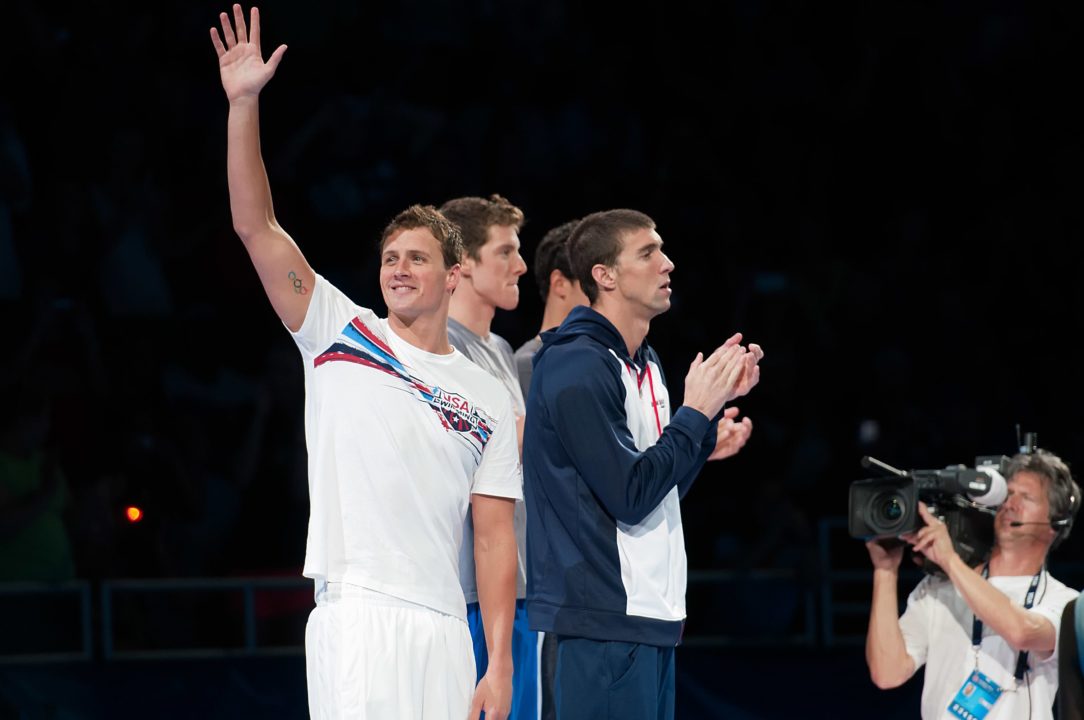I hope you cashed in on your “JEAH” glasses and got your fill of Debbie Phelps pushing her son Michael into a pool.
That’s because beginning today, the USOC’s “rule 40” goes into effect. This is a rule that bans any advertising between July 18th and three days after the end of the Olympics that includes the images, likenesses, or other endorsements of Olympic athletes.
The rule is commonly associated with “ambush marketing,” or the USOC’s aversion to companies’ efforts to become associated with the Olympics without paying the toll by becoming an official USOC partner.
This means companies like Subway (who have been hit by the USOC in the past) won’t be able to play Michael Phelps on their commercials, at least in the United States, through the Olympics – at least not without Phelps risking Olympic disqualification.
The rule seems to date to the days when most Olympians were true “amateurs”. At that point, the rule could be justified as an athlete protection as it helped protect athletes from unknowingly become professionals. In the modern era, though, the rule is used largely to protect the interests of the USOC’s partners and the value of their Olympic Team sponsorships:
However, to protect against ambush marketing; prevent unauthorized commercialization of the Games; and to protect the integrity of athletes’ performance at the Games, the IOC places certain limits on how a Participant’s image can be exploited during the Rule 40 Period.
Waivers can be granted, but they’re usually not to anyone who is a competitor of a USOC partner – which is to say, not very often. It’s more likely that a swimmer could be granted a waiver to wear an alternatively-branded suit to the medal ceremony as they take place shortly after races, but those decisions are handled on a case-by-case basis.
Your favorite Olympians won’t completely disappear from the airwaves, however. For example, Lochte’s latest inspirational AT&T commercial, will still be allowed as an official sponsor. Natalie Coughlin and her P&G commercials should still be running as well.
To read more about the USOC’s Rule 40, check out this pamphlet that they put out in 2011.

Pretty wack. And ironic that they’re using the “amateur athlete” status of Olympians to ban anyone but themselves from making money on the Olympics.
Same thing goes on at NCAAs, just without the exposure. Recall seeing anyone drinking Gatorade that wasn’t in a VitaminWater bottle?
Heard this story on NPR too. I had no idea corporate advertising and marketing have such a strong hold on world viewed events.
Where is the chance for fair competition in that? Now, are these corporations truly embodying the Olympic spirit? There is an informal
Motto of the Olympics that says “The most important thing is not to win but to take part!”
Thanks for sharing news on this story.
Well the only thing that makes me happy is that I don’t have to see or hear lochte’s two now three ladies pimping his stuff.. the past few weeks on twitter and fb have been so annoying They are taking things to an extreme.
Its also making me think that he no longer runs his own twitter.. sometimes it seems like its him tweeting but 95% of the time, its seems like them.. sad sad
Speaking of the Olympics and ads, this one for the paralympics is ah-mah-zing.
There is plenty of this commercial ‘protectionism’ surrounding the olympics not just with US swimming. MacDonalds fries are the only fries allowed in the Olympic area … sounds pretty normal except that in Good old England the ‘chip’ (their thicker version of the french fries) is one of their national foods (pretty boring I know) but how would you like it if you had the Olympics in USA and Hamburgers were banned because of a sponsorship deal with a sandwich company. Also Visa is the only card accepted in ATM’s. It’s the price we pay for the modern Olympics. In Lochte and Phelps case probably not a bad thing … time to focus on nothing but swimming. If all goes… Read more »
yeah, lets see them remove Lochte or Phelps. Those guys should challenge it right not for the good of the rest of the swimmers coming behind them. Come on Phelps…you say you want to move swimming forward….now is your chance to really impact it for others who want to continue swimming professionally
I don’t see how this “ban” is legally defensible as long as the Olympics (logo, images, etc.) are not used in the advertising. If Natalie Coughlin advertised beauty products or Lochte advertised for Porsche, how can the USOC stop this?
I think the answer is that they can’t stop the sale, but they can remove them from the team and remove their credentials. That’s their big gun. Sports are one of the few places in the US where monopolies routinely pass antitrust proceedings.
Do US Olympians sign a contract agreeing that their sponsors cannot use them in ads during the blackout period?